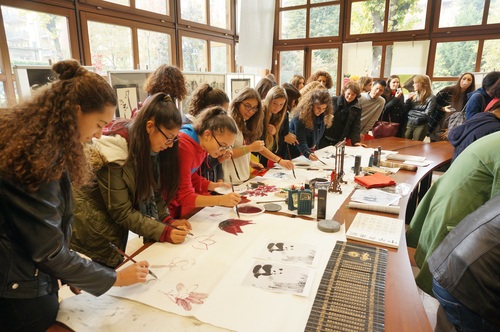In global leadership ratings, China surpasses the United States

On Oct. 28, 2017, students practice traditional Chinese paintings on the annual Confucius Institute Day at the Catholic University of the Sacred Heart in Milan, Italy. The dissemination of traditional culture helps promote China’s international influence.
The approval of US leadership in 134 countries declined to a record low of 30 percent, according to Gallup’s report “Rating World Leaders: 2018” released on Jan. 18.
For the first time, America’s median global approval rating fell below that of China, which was 31 percent. The report points out that the approval of US leadership fell 10 percent or more in 65 out of 134 countries and regions, including many longtime US allies. The image of the United States has weakened in most parts of the world, marking a great shift in the current situation. Donald Trump kept his promise in the campaign to place “America First” during the first year of his presidency, walking away from key alliances and withdrawing from international accords, such as the Paris Agreement.
After the World War II, the United States was the single most powerful country in the world, economically, politically and militarily, said Andreas Kraemer, Mercator Foundation senior fellow and founder of Ecologic Institute. That position was earned because the United States is an open, democratic society with freedom of association, expression, science, the press and religion as well as strong rights and protection for political opposition. A highly effective national innovation system, freedom for entrepreneurship and protection of private property are also important. With the election of Donald Trump as its 45th president, the United States has begun to curtail those important rights and freedoms, and to dismantle policies and institutions for the protection of citizens, consumers, workers and the environment. The United States is failing to guard the values and rights that made it strong. As a consequence, its reputation or “standing” in the world is declining.
According to the report, ratings in Germany and China are relatively stable compared with that of the United States, which gives them an edge over the United States in terms of leadership approval.
Kraemer contended that China’s growth of 6.9 percent in 2017 needs to be broken down into parts. The most important part is the segment of the economy that can have a place in a future sustainable and equitable society in China and worldwide. It creates value without destroying the natural ecosystems and social structures that are the foundation of a harmonious civilization that is in equilibrium with the planet and the resources and ecosystem services the earth can provide. That is the part of the Chinese economy that should be promoted worldwide, not only in China. Sustainable products, processes, technologies and services may be exported to other countries to help them become sustainable, too.
Asit Biswas, distinguished visiting professor of the National University of Singapore, contended that “China’s economic success, massive infrastructure development, academic and research progress, cultural heritage and success in sports will continue to increase its soft power in the future.” China is leading in academics and research developments. From 1996 to 2013, the share of global research and development (R&D) expenditure fell from 88 percent to 69.3 percent in high-income countries, while China’s share increased from 2.5 percent to 19.6 percent.
“China’s robust annual growth is good news for the world economy, of which China is now one of the main engines. It shows that the Chinese government remains committed to ensuring high growth, even amid the transition to a new growth model based more on domestic consumption. Particularly for Latin America, a growing China means that demand for commodities will remain sta-ble, a boost the region desperately needs after years of sluggish economic growth,” said Bruno Binetti, assistant researcher of the Inter-American Dialogue.
ZHAO YUAN is a correspondent at Chinese Social Sciences Today.
